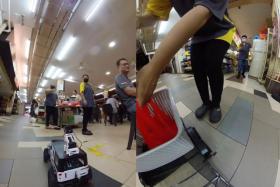The rise of the machines need not be scary
While they can outperform humans on analytical, cognitive tasks, humans will remain vital for ones that require emotion and empathy
As technology becomes better, smarter, smaller and cheaper, more and more services will be shifted from humans into the hands of robots.
In a recent study with colleagues in universities in Britain, the US, Germany and Australia that was published in the Journal of Service Management, we looked at the social and ethical implications of this brave new, robot-driven services world - and what it may mean for the people working in it.
A key point to clarify is that the rise of this new generation of service robots does not mean an impending takeover by an army of Terminator-style machines.
In fact, many of the service robots of the future will be virtual rather than physical, similar to the Siri, Alexa or Google Home services many of us already have and use today.
In the next few years, one of the most crucial developments is likely to be the emergence of robots capable of interacting with human customers in a natural (or almost natural) manner.
One of the leading players is Google Duplex, which uses machine-learning technology to engage in natural conversations as it carries out real-world tasks over the phone.
Recordings of Google Duplex in action, such as making restaurant reservations, certainly sound natural.
A critical factor in how far robots take over will be whether these machines can feel real emotions and show genuine empathy and concern for customers.
Already some advanced robots have the capability to detect different emotions in humans and respond to them. Yet this response is pre-programmed, rather than a genuine emotional consciousness.
As a result, there remains debate on whether robots can be effective in providing emotional and social services at a level humans can.
In theory, if robots were ever able to convincingly match human emotions, all human service provision could be replaced by non-human frontline staff.
But this is unlikely to happen in the foreseeable future.
This means humans will still be needed for service roles that require deep emotional feelings.
Today, robots in more routine or mundane service situations - in the role of a bank teller, for example - can mimic surface-level emotions to a high level.
Being robots, they will be able to do this consistently, at any time and without tiring.
However, having true feelings when interacting with customers or out-of-the-box thinking to a human level is likely to be much further off.
What we will see in the future is the greater likelihood of human-robot partnerships in delivering service.
Robots are outperforming humans on analytical and cognitive tasks, but humans will remain vital for emotional tasks.
One area where this will be key is in healthcare and medical services. A service robot, for example, will be able to rapidly map patient data and symptoms against its knowledge base and provide probabilities of even the rarest diseases for a doctor to consider and explore further.
Likewise, a robot could undertake relatively simple processes such as taking a patient's blood pressure, assessing other health indicators and preparing medication, leaving a human nurse to focus on soft skills such as displaying empathy, caring and affiliative communications to put the patient at ease.
But as we become more engaged with robots, issues of privacy, personal liberty and security will need to be addressed.
There will also be significant social challenges that will need to be addressed.
Certainly, many service jobs will be lost; others that do not yet even exist are likely to be created.
Previous experience has taught us that it is unlikely that the latter will balance the former.
With this in mind, governments and societies will need to prepare to face some difficult questions.
Loss of wages will be an obvious challenge, but there will also be issues of security, human dignity, self-respect and role in the community, among other factors that will need to be addressed.
Meeting the challenges of the coming brave new world will require brave new thinking.
The writer is professor of marketing at the National University of Singapore (NUS) Business School and the opinions expressed are his own and do not represent the views and opinions of NUS. This is an edited version of an article that was published in The Business Times yesterday.
Get The New Paper on your phone with the free TNP app. Download from the Apple App Store or Google Play Store now

